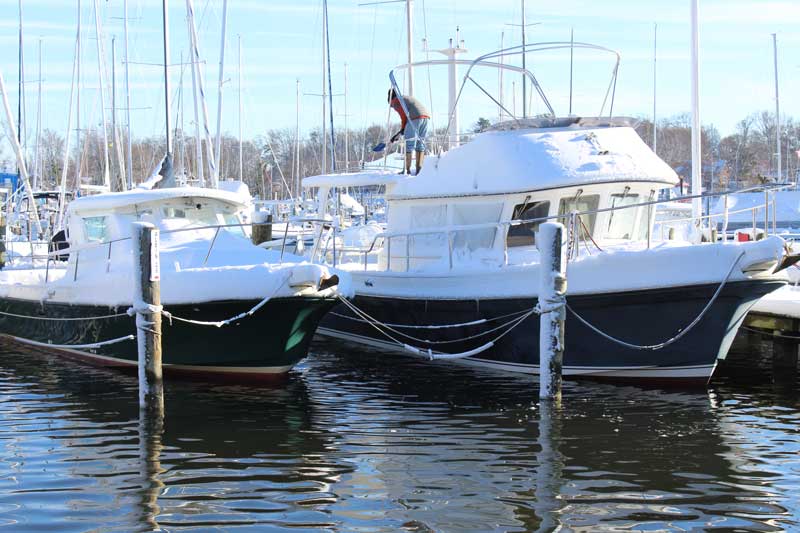For boaters who are on the water (or even near it) all winter, we’ve compiled a few cold-weather winter safety reminders. I know, you’re not planning to slip, or lose your balance, or fall in the water, or have engine trouble. But… it’s just that none of us ever plans on that stuff happening. During the summer such mishaps might simply be irritating, but in the cold, a similar accident can be deadly.

1. Use cation on slippery docks and decks.
Docks don’t have to be covered in ice and snow to be slippery. A nearly invisible layer of frost is all it takes. Before you leave home, consider your footwear. You’ll want boots with good traction. Don your lifejacket before stepping onto the pier, and for gosh sakes, before you step from pier to boat.
2. Where’s the ladder?
Whether at a marina or private residence, any pier should have a ladder into the water for year-round safety in case someone falls off the dock. Have you taken notice of it recently? What condition is that ladder in? Is it stuck in the “up” position? Covered in barnacles? Close to your boat? Sure, in the summer you could swim to it, but during the winter if you become submerged in cold water, its effects will make swimming nearly impossible. Make sure a ladder is close to your boat.
3. Enemy number one: cold water
This is where the real danger lies. Cold water is never to be taken lightly because its effects will be immediate, starting with the shock factor that causes gasping, even underwater. Submersed in really cold water, your window of opportunity to keep your wits and maintain some semblance of coordination may be extremely small. Expect to be swiftly limited in your ability to tread water or swim. See “keep dock ladder close” above.
4. File a float plan
Even experienced sailors and boaters sometimes wonder, “what exactly is a float plan?” At minimum you want to send a text or leave a message or note with your destination, planned route, and expected timing. A description of your vessel and the number of people onboard is also important. You can find a very thorough fill-in-the-blank float plan form at floatplancentral.cgaux.org.
5. Provision Differently
In the heat of summer, we’re concerned about sun protection and dehydration. In the winter, you’ll want items to keep you and your crew warm and dry. In addition, it’s smart to stow emergency supplies in case the worst happens—someone falls in the cold water (see “enemy number one” above). Warm drinks, hand and foot warmers, good hats, water-resistant outer layers, and gloves are all key. Keep a VHF radio close at hand to hail help, and stow below a dry change of clothes, socks, blankets, and an extra coat and hat.
Find more cold-water safety tips at boatus.org.